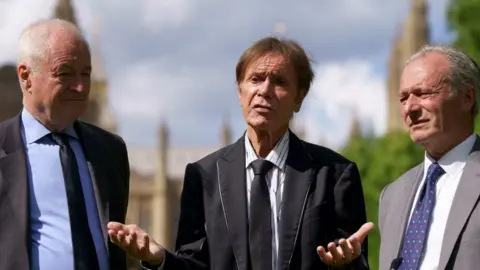Sir Cliff Richard urges anonymity for sex offence suspects
 PA Media
PA MediaSir Cliff Richard has made an impassioned plea to MPs and peers to grant anonymity for sexual offences suspects before they are charged.
At a meeting in the House of Lords, he spoke of "how desperate it is to be accused of something you never did".
And he urged politicians to back a change in the law to protect people who are wrongly accused.
Police raided the singer's home in 2014 as part of an investigation into a sex assault claim. He was never arrested.
He told the meeting how the media coverage of the allegations had "nearly destroyed" him and that he would never fully get over it.
But he said he wanted the law to be changed to help "regular people" who had endured similar ordeals.
Sir Cliff successfully sued the BBC for breach of privacy over its coverage of the police raid, which it filmed from a helicopter and broadcast.
Currently, alleged victims of sexual offences receive lifelong anonymity but there is no law against naming a suspect.
The College of Policing advises officers not to name those arrested or suspected of any crime, "save in exceptional circumstances where there is a legitimate policing purpose for doing so".
Once a person is charged, they are normally named by police, but the media often names those who have been arrested but not charged.
Campaign group FAIR (Falsely Accused Individuals for Reform) has called for pre-charge naming of sexual offence suspects to be made a criminal offence in England and Wales.
The group, backed by Sir Cliff and other high profile figures including DJ Paul Gambaccini, have drafted an amendment that would outlaw the practice.
Opponents of anonymity argue that naming people under investigation for sex offences encourages other alleged victims to come forward.
But Mr Gambaccini told the meeting the police should be professional enough to build a case without encouraging "bandwagoners" with "frivolous" allegations.
'Step backwards'
"This is not the way you run a justice system. You don't throw out names and see who gets accused," he told the BBC.
The group's proposed legislation would allow sexual offences suspects to be named if the courts believed they represented a threat in the "present moment", he added.
Mr Gambaccini was arrested over sex abuse allegations in 2013 but the case was dropped a year later.
Former Tory MP Harvey Proctor, who had his home raided and was publicly named during Scotland Yard's probe into fabricated claims of a VIP paedophile ring at Westminster, said the campaigners were "united for a common cause to return fairness to our criminal justice system".
But in a statement Andrea Simon, director of the End Violence Against Women Coalition, said: "This is not the first time these calls have been considered by parliamentarians.
"They've previously been rejected as a step backwards - one that would send a message to sexual offence victims that they are less likely to be believed than victims of any other crime."
She added that the legal system needed to be "open and transparent" to maintain public confidence.
"We urge these men to instead use their positions of power and status to highlight the real issue - that our criminal justice system is stacked against survivors, the vast majority of whom are women."
FAIR is hoping its draft amendment will be added to a future criminal justice bill by a sympathetic peer.
Labour peer Lord Campbell Savours, who hosted the meeting, said he believed it had a "good chance" of being passed by the Lords but would probably be blocked in the Commons by "very articulate women MPs who feel very strongly that the law should not be weakened".
A number of other peers, including leading barrister Lord Pannick, and Conservative MPs Nigel Evans and Esther McVey, also backed the proposals, as did Christine Hamilton, who was at the meeting with former MP husband Neil.
The Hamiltons faced sex assault allegations in 2001, which were dropped by police.
